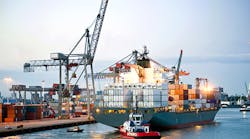With enough time and proper organization I could write column about China every day. Every day, in ways large and small, we are dealing with China in our public and economic affairs. It's easy to find examples of the impact in specific incidents — for example, the liquidation of Amcast Industrial Corp., which declared bankruptcy after losing its General Motors aluminum-wheel supply contract to a Chinese contractor.
Our dealings with China are just as illuminating from the wide-angle view — as, for example on February 27, when a sudden drop on the Shanghai stock exchange triggered a sell-off in markets around the world, and a loss of 3.3% in the Dow Jones Industrial Average. It was the steepest DJIA decline in over four years.
Market analysts always seek neat explanations, and the next day their quick, but vague, consensus was that shareholders are wising up to the inherent risk of an overheated economy. Wouldn't it be more instructive to speculate that investors are growing wary of the fundamental implausibilities of Chinese "capitalism."
In China, cheap and abundant labor manufactures virtually every material and product needed for modern life, and these things are exported to a waiting world whose payments make China increasingly wealthy. That increasing wealth is magnified by restrictions on life and commerce. And, that wealth is used to buy foreign currencies, in particular U.S. dollars, ensuring that the gulf between currencies remains a Chinese advantage. Our interdependency cannot and should not be undone, but it's not an honest relationship.
As it turned out, the February collapse was a one-day story: bargain hunters picked up some undervalued prizes the next day — a reminder that it's market activity that determines valuations, not after-hours analysis. It's obvious, though, that the one-day story will return every time the increasingly sophisticated Chinese investors seek to protect their gains from the papered-over inefficiencies of their domestic economy.
China's benchmark stock-index values increased 130% in 2006, and domestic investors know well the inclination of their government's central planners to control the growth of that vast economy. And, outside of China, nearly everyone recognizes that China's "managed economy" (as lenient analysts like to call it) is really a high-wire act of state-controlled industries, regulated investments, and currency manipulation.
Dealing with all this in the individual cases is impossible, as one company after another learns in the most painful ways. So, it's encouraging to see greater determination on our side to acknowledge and address these realities.
First, U.S. Treasury Secretary Henry Paulson took the message straight to China, candidly laying out to financial officials there how much they risk by failing to normalize their oversight principles: "An open, competitive, and liberalized financial market can effectively allocate scarcer resources in a manner that promotes stability and prosperity far better than government intervention," Paulson said.
This is welcome improvement to the patient persuasion the U.S. has offered over the past decade. Even more welcome is the legislation now moving through the Congress. The Fair Currency Act, aka the Ryan-Hunter bill, would enable the U.S. International Trade Commission to consider currency manipulation by foreign governments as one consideration for determining whether petitioning manufacturers have been injured by imports from those nations. Significantly, the proposed law also would set the guidelines for the ITC to follow when determining whether currency manipulation has occurred.
"China will follow our own schedule," responded People's Bank of China's deputy governor Wu Xiaoling, to Paulson's speech. That's undoubtedly true, and China is wealthy, diverse, and resourceful enough to do it. But, a nation that's been welcomed into the global economy, and that relies so completely on other nations to consume its output, should be willing to succeed without cutting corners. Likewise, the nations that trade with China should be wise enough to insist that it be done in honest terms.








